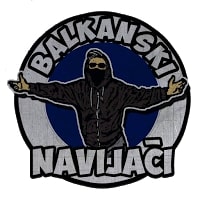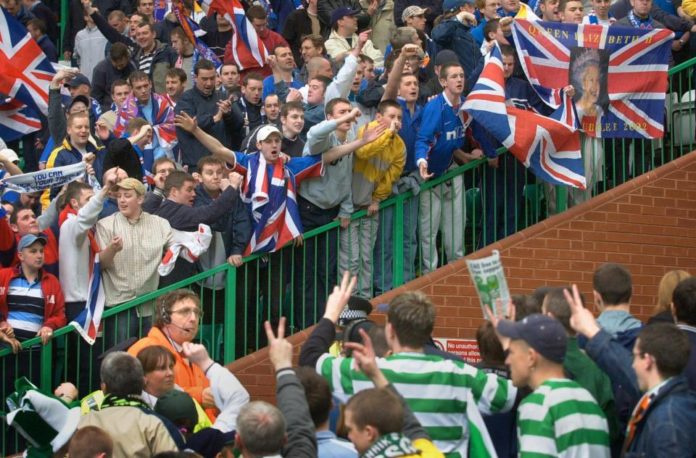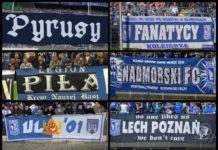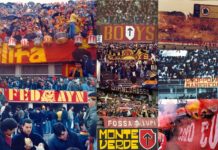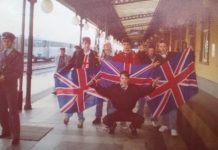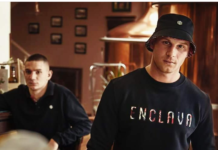R A N G E R S – C E L T I C
Rangers F.C.
founded in 1873
stadium: Ibrox Stadium with a capacity of 50,444 seats
club color: royal blue
the most successful club in the world by the number of national champions won – 50 times the champions of Scotland!
European trophy: 1972. winners of the European Cup Winners Cup.
record-breaking visit: 118,567 spectators in the derby against Celtic on January 2, 1939
Celtic F.C.
founded in 1888
Stadium: Celtic Park with a capacity of 60,355 seats
club color: green and white
title: 39 times Scotland champion (counting this season)
European trophy: 1967 European champions (Celtic was the first British club to win a European championship)
record-breaking visit: 92,000 spectators against Rangers on January 1, 1938
There are a few cities in the world that can boast a football derby. When we say the major derby here, we primarily refer to the traditional meetings of two trophy teams from the same city. With us, this is a match between Partizan and Zvezda. When playing a major derby, on that day, all friendships are forgotten, you are uncomfortable with your parents, a girl, a woman, and the victory against the most disadvantaged rival to most fans is even more important than winning a title. Often, the unsuccessful season is saved by a victory against the city rivals. That day, your stomach is squeezed, your arms swell, and you're nervous than usual. You do not have anything to eat, it's not your fault! The worst is when the game starts later (five, six in the afternoon), and you are awakened by nervousness, if you could sleep at all earlier. So then turn the movie in the head of the derby already played or did you just dream it? And then what to do all day long? Of course nothing! You bite nails, and you watch every five minutes per hour. This game, regardless of its importance, is always the most important. You do not need titles, cups, or participation in European competitions, just to win the big rival. However, Belgrade's eternal derby also has that emperor almost always directly decide on the champion! In Spain, for example, the tension rises when Real and Bars meet, but in the rivals of the Madrid rivals (Real Atletico) and Barcelona (Barcelona-Espanyol). In England, derby matches in London (Arsenal-Tottenham, Millwall-West Ham …), Manchester (United-City), Liverpool (Liverpool-Everton) or Birmingham (Villa-Birmingham) are always simple matches, but the match between Manchester United and Liverpool (in the last couple of seasons of Manchester and Arsenal) traditionally clinched two of the best and most frugal clubs that often directly decided on the championship.
Italy can boast some of the most interesting city derby. First of all, we are thinking of meetings between Rome and Lazio, as well as Inter and Milan. In addition to these two duels, major derbies are played in Torino, respectively, but they are matches that, for example, Juventus meet with Inter, Milan or Roma, however much more interesting (from a football, not a corner) and result more important than the matches against the rivals Turin which is currently second-class.
South of us, Athens has mobilized all available police and military forces so that the match between Olympiakos and Panathenaikos runs without incidents (which is almost impossible), and a similar situation exists in Istanbul when meeting Fenerbahce, Galatasaray and Besiktas.
One duel of eternal city rivals still bounces from others. In it, the tension is much greater than anywhere else, and it is almost always decided directly by the champion or the conqueror. This match is not only a clash between two teams and two armies of fans, but it is about rivalry with a much deeper background, two religions collide. Of course, there are two of the most successful Scottish teams in Celtic and Rangers.
What about Scottish football? Average or even below the European average! Football is one of the few things of life that are taking place in Scotland independently of the English. While the English are considered to be the founders of modern football, Scots are those who have contributed much to his training, especially at an early stage. The Scottish Football Association was founded in 1873, and the next is the first ever competition. Only a few teams from that time exist today, while many have disappeared after only a few years (like Third Larnaca and Vala Of Leven). The professional league began to play in the north of Great Britain in 1893 and the first title, in front of the nose of the rivals Rangers, was won by Celtic. Since then, the big duo from Glasgow has won over 85 percent of the title. Other Scottish clubs almost have nothing to look for in the joint league with Celtic and Rangers, so on several occasions they have been nominated for their transfer to the Premier League of England. Both clubs have greatly grown their competition in the league, and they are far from the others, both in terms of the number of fans and organization, finances and playgroups. It should be a real miracle so that a third team seriously interferes in the fight for the title, or at least divide the rivals at the top of the table.
Throughout the last century, only fifteen times the champion of Scotland was not one of the two Glasgow teams, and last time another club was able to win the title in 1985 when the champion was Aberdeen in the lead with Alex Ferguson. For now, however, everything is left only on the proposals and wishes of the small teams and the big sponsors, so that since moving away from the rivals in England, there will almost certainly be nothing.
When the founders of Rangers showed no interest in religion, they did not emphasize that they were Protestant clubs. Fifteen years later, with the founding of Celtic, Glasgow split into protestants and Catholics, at least on Rangers and Celtic. The immigrants from Ireland, the Catholics who were then a minority in the city, gathered around their Irish tricolor, founded their football club and gave it their green and white colors. The connection between the club, the navy and the Catholic Church was very strong from the start.
Since then, an unwritten rule has been created in the Protestant Ranger that no Catholic can wear a blue jersey, nor be employed in any function at the club. Soon the derby of the games in Glasgow became known as “The Old Firm”, which in a literal translation would mean an old one. These are games that have been played each season since the formation of both teams, lately, due to the system of the competition at least four times, there is a big deal in the game, and the stadiums are always sold out in advance.
Long before the appearance of the first hooligans in the island's old stadiums, the “The Old Firm” march filled with disorder. Going to the game for the fans of both teams, is naughty with going to a religious war. The whole town was divided at that time. The eastern region was settled by Catholics, Celtic fans, while the rest of Glasgow was made by Protestants. In 1921, during a derby, a wooden stand was broken. Twenty-six people were injured, and over a hundred of them were injured. Fifty years later, the biggest tragedy in Scottish stadiums took place. At the end of the game Celtic-Rangers, under the pressure of the masses, the stairs collapsed. Sixty-six fans lost their lives, and almost forty of them got injuries. During the derby in 1975, two fans were killed and nine others stabbed with knives. At one point, doctors could barely pat a hand that was cut in a few places by an ax. Another thirty-five fans of both teams were held on that day in a hospital treatment. After a series of incidents everything culminated in the derby in the Cup final in 1980 when the game was barely end up due to the general squad on the stands. Despite the great pressure of the football federation, Rangers still did not think that he had brought a Catholic player into his ranks, while Celtic, in which there had always been protesters, (in Celtic was played Protestant Bertie Peathingy, who was even allegedly an extreme member of the order Protestant oranges) refused to remove the flag of Ireland from the stadium.
Part II:
In 1989, the Rangers coach, legendary Graeme Souness, gave a shock statement to the press conference that he was exclusively interested in the success of the team and the quality of the football players, not their religious affiliation. On the same day, he was promoted by a new amplification, Catholic Maurice Johnston, a former hero from the Celtic Park. To the extent that the public supported him and called him a peacemaker, the most stubborn Ranger's fans were crashing on him, who did not overlook the fact that the hated Mo Johnston, who even crossed them (the protesters never baptized) while leaving the court when In a derby in 1986, the referee showed him a red card, wear a blue jersey. Many fans at Ibrox simply did not count Mo's goals, while the most extreme even silenced those who rejoiced in his fate. A few years later, English reporter Mark Hateley also did not come to welcome Rangers fans, as they themselves were not sure if he was Catholic or Protestant. Hateley was actually married to a Catholic who was inconceivable to the fans. A similar fate was experienced by Trevor Francis, who was reported to have enrolled his children at the Catholic school, and the whistleblower from the stands was welcomed by Protestant Mark Falco as he had the custom of being baptized.
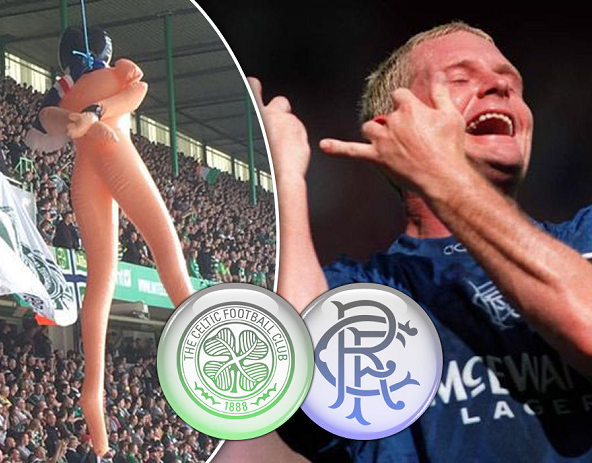
Today, the situation in the city itself has changed much. A large number of Catholics are lawyers, judges, doctors, which was unthinkable fifty years ago. Catholics and prattestants live next to each other and hatred is no longer so pronounced, although all good neighborly relations are forgotten on the day of the game. The players of both clubs and all staff are familiar with the rules of conduct while the match takes place. For example, the director of Rangers was forced to resign after the cameras had shot him while singing the conquered cup with the fans of the anti-Catholic song. Half the ninety-eight in the blue jersey was played by the always-incredible Englishman Paul Gascoigne who once simulated the playing of the frule (traditional instrument oranges) before the fans of Celtic. Penalties followed the popular player, but he, like in many cases before that, did not care much, and he resembled a similar gesture a few years later as a player of Middlesbrough. In a friendly game, his team then met with his ex. The whole stadium scandalized him, and Rangers fans welcomed him ovations. The song “Gazza, Gazza lets play the flute” asked him to beat them again once again, which he did of course.
“The Old Firm” derby has distributed Scots around the world, from America to South Africa, but the situation is most complicated in Alster or Northern Ireland. Wearing a jersey of any club on the streets of Belfast is considered provocative and more than dangerous, and even the police stopped and legitimized those who were dressed in club colors. As the residents of the capital city of Northern Ireland are already over the head of religious intolerance, both of them have begun to laugh, and rather they do not wear blue or green white jerseys. Many of them work together and they avoid any story about who is who, what is well known and famous phrase: “Whatever you said, I did not hear you.”
During the seventh century, Protestants moved from Cromwell England to the Irish province of Ulster, now known as Northern Ireland, and appropriated the most fertile land for themselves, imposing their laws and codes of conduct on them. Only then did the Irish begin to organize, because they did not want their country to be ruled from London.
At the end of the nineteenth and during the first half of the twentieth century, Belfast had its own imitation of The Old Firm derby. In 1891, Belfast Celtic was founded, modeled after a club from Glasgow. The match against the Protestant teams was no less fierce than in Scotland, and in 1940 the game with Linfield was interrupted for shooting. Nine years later, after the general squad of fans and players of both teams, there was a lot of injury on both sides and the worst was passed by one Linfield fighter, who was broken leg. Shortly after these incidents, Belfast Celtic ceased to exist, and Catholics began to follow a small club from neighborhood Cliftonville.
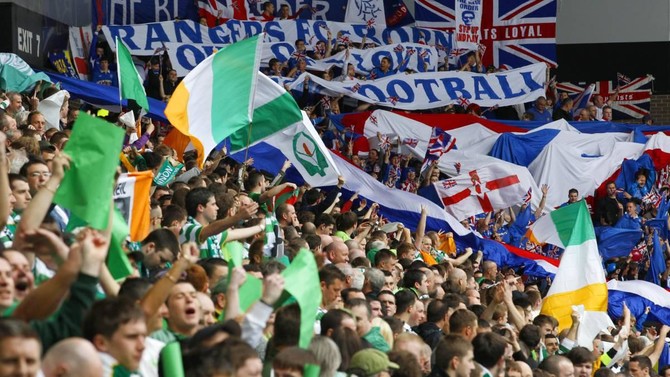
However, both clubs from Belfast are too small, so all the fans are turning to their rivals from Glasgow. It is exactly the fans of Celtic and Rangers from Northern Ireland who are considered the most trusted in Britain. More than eighty percent goes to every game of their clubs. Catholics from Belfast who go to Celtic games are mostly Sinn Fein's voting body, and fifty percent do not have a permanent job. Particularly interesting are the departures on the derby stage when the fans of two teams are obliged to travel separately ships. “Celtic is an Irish club that plays in a foreign league, which is strange,” said Paul Hamill, a Celtic player from Belfast, on the occasion, and added: “In Northern Ireland, you are deciding on a birth for one or the other. There are no neutral ones. Ever since my little recount, Celtic has pulled me in the ears as well as my mom or dad. “Since Celtic fans are mostly Irish, they follow Ireland's reprints. Rangers fans do not care much about the reprints of Scotland. There is even a story that some celebrated when their idol Paul Gascoigne scored a goal for England against Scotland at the European Championship.
In the last decade, Celtic culture has become popular across Europe. Traditional Irish music and dances are popular in many countries.
The Celtic fans are mostly Catholics or “Tims” as they mockingly call them. Rangers are “Prods” protests, Unionists, loyalists … What is interesting is that none of the other fans are hooligans and rarely cause incidents except in the mutual duel, but they are based exclusively on a religious basis. “Celtic does not have a Casulas team. They are all dressed in striped green white jerseys and tracksuits and rarely cause disarray. Rangers is already a different story, but they also lag far behind the hooligans of Aberdeen, Motherwell, or Hearts. Rangers, however, have Casuals, dressed in the model of their southern neighbors. They are called the Inter City Firm (like West Ham, although one has tried to make the ICF abbreviate as Ibrox Casual Firm). A lot of them wear “Hackett” clothes and this collection with St. George with a cross (English flag) on the chest. “Adds our interlocutor.
Celtic fans every year in the middle of March celebrate St. Patrick, while the Rangers celebrate July 12, 1690, the day William, Prince of Orange (Dutch origin) in the Battle of the River Boyne, dragged King James Stuart and his tyrannical authority. Then a monarchy and parliamentary government was established. Every July 12, in the glorious Revolution, festivals and traditional Orange Marches are organized (The Orange Order is an Irish Protestant Society founded in 1795) in the cities of Great Britain as well as in many places in Europe.
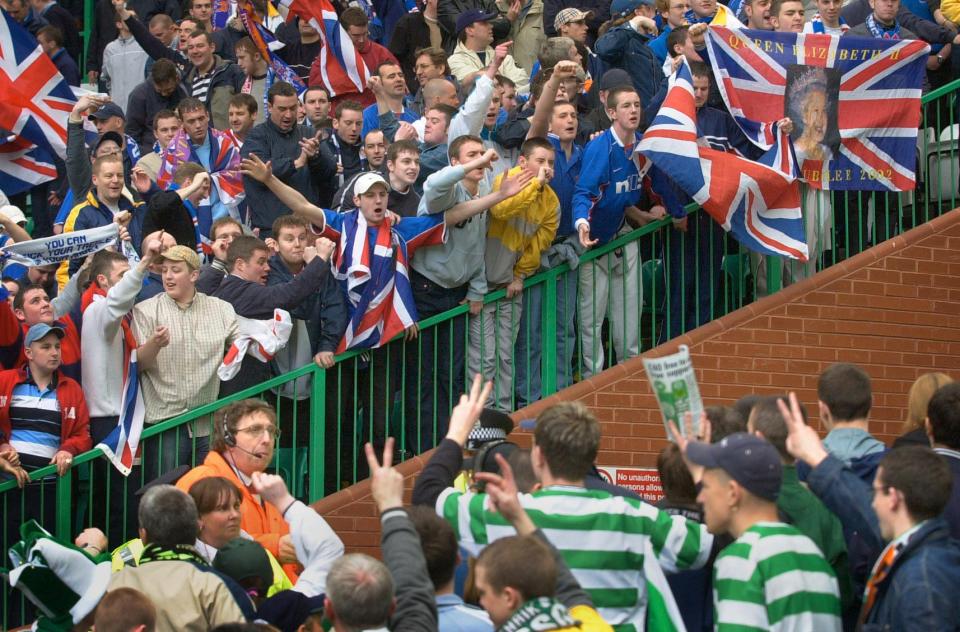
“The songs of the fans of Celtic are mostly Irish traditional, and it is only about the success of the club (winning the European titles in 1967) or the players. Celtic, Celtic are scouting, Henrick Larsson is greeted, and the entire stadium is packed with the appropriated Liverpool's “You Will Never Walk Alone” or the club “Heil, Heil The Celts Are Here!”. When the Celts scroll ” f ** k the Queen! ”, On the opposite side comes the answer ” f ** k the Pope! ” Rangers’ songs are mostly ” sectarian ” (not to say sectarian in order to be in the literal translation, but rather religious but “sick” content and full of hatred with regard to the past), and except on a few occasions when the club is scandal, everything else is reduced to calling the Catholics. “Your moms are stealers, your dads are dealers ! “(your mothers are thieves, and your fathers dealers) sang all seven thousand fans of Rangers, alluding to the dirty jobs that the Irish are traditionally vicarious. On several occasions, “Hello, Hello We Are Billy Boys!” Shouted: “Billy Fullerton was a local mangup, a small crime, a protestant and, of course, a fan of Rangers, whose Razor Gang glows and lights up Glasgow for the twenties years of the last century, although in some places there is a version of Billy's association with Prince William's nickname). Songs “The Sash” (a canvas that oranges carry over the shoulder over the shoulder) and “Derry's Walls” are singing in full with several sculptures. From this second, the famous slogan “No Surrender” (… and the cry was no surrender; surrender or yell die, die, die; with heart and hand and a sword and a shield; we will guard old Derry's walls .. .). One call to the IRAs while others spit and sing about UDF … everything is overly and difficult to understand.
